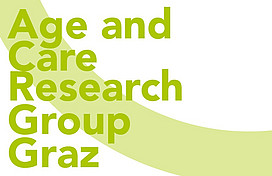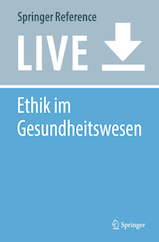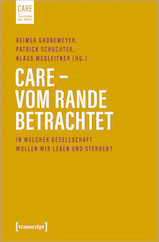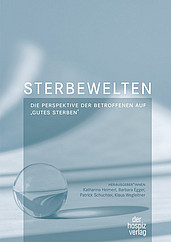End of this page section.
Go to overview of page sections.
Begin of page section: Additional information:
End of this page section.
Go to overview of page sections.
Publications
Begin of page section: Contents:
Ethik in der kommunalen Sorge: Lebenskunst und ethische Spannungsfelder
Patrick Schuchter, Klaus Wegleitner, Andreas Heller
The ethics of communal care requires a paradigm shift in access, since in contrast to ethics in medicine and nursing or in hospitals, nursing homes and outpatient care, it is not the institutions that form the essential background, but the everyday life and relationships of people. Questions of care or medical ethics do not come to the fore, the providers play a relative role, but, conversely, the focus is on everyday life and the need for care, in which medical and care-related aspects play a role. Such an everyday network character of the ethical perspective and the concrete ethical areas of tension must be taken into account. So what are the basics of communal ethics? How can ethical issues in the community be addressed? Outlines of an ethic emerge that lie in the paradigm of preventive and resource-oriented health promotion or public health access. Ethical questions and areas of tension exist in the open field of the “third social space,” not “per se.” They have to be viewed from different perspectives. A “community” is a fluid fabric of relationships in fuzzy living spaces that are “felt.” Correspondingly, actors who are involved in the development of communal care present themselves ethical questions as a complex “fabric” of areas of tension. To shed light on some features of this tension-fabric is the aim of this contribution, which ultimately enables the organized ethical discussion to be dealt with in a communal setting.
Schuchter P., Wegleitner K., Heller A. (2021) Ethik in der kommunalen Sorge: Lebenskunst und ethische Spannungsfelder. In: Riedel A., Lehmeyer S. (eds) Ethik im Gesundheitswesen. Springer Reference Pflege – Therapie – Gesundheit. Springer, Berlin, Heidelberg. https://doi.org/10.1007/978-3-662-58685-3_59-1
The article is published in German.
Care – Vom Rande betrachtet In welcher Gesellschaft wollen wir leben und sterben?
Reimer Gronemeyer, Patrick Schuchter and Klaus Wegleitner (Eds.)
"Care" is at the center of life, but on the fringes of society. At the edge of existence, contradictions become particularly clear. The contributors to the volume span an arc from the vulnerability of existence and the movements of the mind on the edge of life and society to questions of how care can transform science, society and its organizations from the edge: What helps us dealing with the inextricable contradictions of life and death? In which society do we want to live? An inter- and transdisciplinary dialogue with the work of Andreas Heller.
Book is published in German.
Worlds of Death. The Perspective of Those Affected by "Dying Well"
Katharina Heimerl, Barbara Egger, Patrick Schuchter and Klaus Wegleitner (Eds.)
ISBN 978-3-946527-38-1
Publication date: April 20, 2021
Dying is part of life, dying worlds are part of life worlds. But: What is the "world in itself" about and how are the worlds of death and worlds of life related? And what does "good death" mean from the perspective of those affected?
Talking to the dying and learning from them - that this is possible, insightful and urgently needed has not always been taken for granted. It was only the modern hospice movement that broke the silence about people's end-of-life experiences and made conversations with dying people their starting point.
Affected by the world of dying are not only people with advanced and incurable disease, but also very old people, people with dementia and relatives who have accompanied a dying person or a dying person. Those affected have a lot to tell about the world of their dying, about what "good dying" means for them, who is important to them and what is important to them in the last phase of life. They are given a voice in this volume, and in numerous interviews they tell the research team about what is important for their dying world.
Most people still want to die at home. It is all the more surprising that the question of the place of death is not central for those affected once the time has come. Dying is a social process, this is how the researchers interpret the interviews. They tell stories of family, professional and civil society networks that gain in importance in the face of approaching death.
Professional carers, doctors, nurses, managers and family counseling also have their say with their view of the world of dying. They see themselves as advocates for the needs of the dying. If what is important to those affected in their dying world is respected, then good death is possible in many settings in the hospital, in the hospice or in the nursing home.
Book is published in German.
Vol. XIX: Foreign Countries of Old Age: East and Southeast European Perspectives on Aging
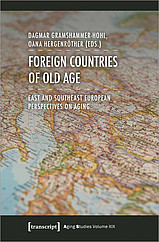
Edited by Dagmar Gramshammer-Hohl and Oana Hergenröther
5 January 2021, 390 pp.
ISBN: 978-3-8376-4554-5
The exploration of what May Sarton calls the »foreign country of old age« usually does not go far beyond the familiar: the focus of aging studies has thus far clearly rested upon North America and Western Europe. This multi-disciplinary essay collection critically examines conditions and representations of old age and aging in Eastern and Southeastern Europe from various perspectives of the humanities and social sciences. By shedding light on these culturally specific contexts, the contributions widen our understanding of the aging process in all its diversity and demonstrate that a shift in perspectives might in fact challenge a number of taken-for-granted positions and presumptions of aging studies.
Who Cares? Altern und Pflege gemeinsam neu denken: Interdisziplinäre Alternsforschung am Standort Steiermark
Editors: Anna-Christina Kainradl, Ulla Kriebernegg, Eva-Maria Trinkaus and Katharina Zwanzger

Alter(n) und Pflege gemeinsam neu denken: Interdisziplinäre Perspektiven aus Wissenschaft und Praxis
(Rethinking Old Age and Care as a Whole: Interdisciplinary Perspectives from Science and Practice)
Retail price: 19.90 EUR
ISBN: 978-3-7089-2045-0
Editors: Kainradl Anna-Christina, Kriebernegg Ulla, Trinkaus Eva-Maria, Zwanzger Katharina
Facultas Publication Date: 02/22/2021
Language: German
This anthology is a collection of papers by researchers involved in the Who Cares? Alter(n) und Pflege gemeinsam neu denken Project and it contains scientific and practice-related experience and knowledge with contributions from various disciplines and fields of practice that deal with questions of age(ing) and care in our society. The multidisciplinary texts show which discourses and narratives shape how we deal with age(ing) and care, which processes are already taking place with regard to positive change, and which strategies are still needed to be able to rethink age(ing) and care together in a positive way.
End of this page section.
Go to overview of page sections.
Begin of page section:
End of this page section.
Go to overview of page sections.
